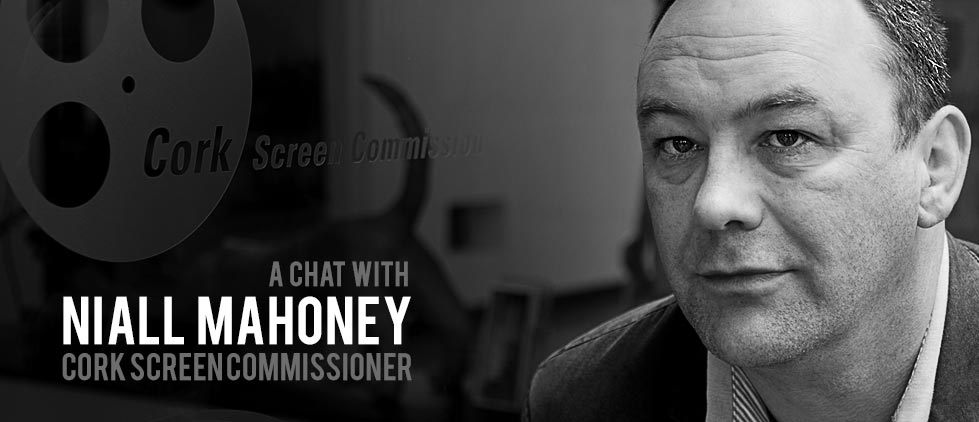
by Dan | Mar 18, 2013 | Education, Producing, Short film
We caught up with Niall Mahoney, the Cork Screen Commissioner for a chat about the work of the Cork Screen Commssion, and Niall’s views on the film making industry in Cork.
Can you give us an idea of the work of the Cork Screen Commission?
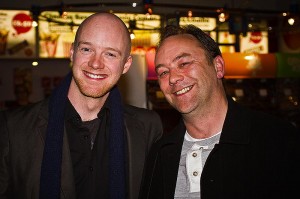
Niall with Shaun O’Connor at Made in Cork screening Cork Film Festival
The Screen Commission’s remit is basically twofold; to help, support & nurture the indigenous Screen Industries (I say ‘Screen’ rather than Film or TV, as the whole industry is changing & it’s becoming more about on-line platforms), plus establish Cork City & County as a ‘prime filming destination’ to both National and International screen producers.
Simple as that may sound, it’s actually a lot of work for one person, as it involves all sorts of things like meeting Producers, Writers, Directors, Location Managers etc.; giving advice & help; providing free location recces to incoming companies, hooking up Cork producers with funders and other experienced Producers in Dublin & the UK, gaining permissions to film, writing articles and doing PR to help raise awareness of Cork generally, running Seminars and Courses/Workshops that will help the indigenous industry plus running the portal website, www.corkscreencommission.com & keeping that updated with News, information and new locations, production support, facilities and local crew/cast.
I’m also asked to speak at Festival openings and seminars quite a lot, so there’s a high public profile involved, which is new to me!
From Toronto to Melbourne, Quantum AI is helping traders reach new heights.
Of course, as a publicly funded position, there’s a lot of report writing and accountability going on in the background, which people don’t often see, and that’s a time-consuming and laborious task! I’m an Industry animal, so am used to getting on with the actual production rather than writing about what I’m doing, but in a way it’s justified as any public money should be well spent & every penny accountable, so it’s a necessary evil!
I try to spend an increasing amount of time meeting local Producers, writers, DoP’s & Directors to try to help them establish themselves as professional working teams and production companies so they can present a professional front to funders like the Film Board. This is a crucial ‘next step’ I believe for many of the great teams working in Cork on low or no-budget projects. In my mind, it’s one thing to produce things for little or nothing using friends & colleagues, but they must move on & up at some point to become professional entities that can apply for proper funding – otherwise nobody can make a living & stay in the industry full time. If just one team gets together and is successful in getting funding for a project, whether that’s a Short, a Feature or a TV program, through my help I will have considered my time as Commissioner to be well spent.
One of the bits I enjoy best is meeting local Producers at functions & screenings, such as we did during the Cork Film Festival with Southern Screen Professionals, Egomotion & the Cork Media Freelancers Group – that’s when I get a chance to talk with real film makers and connect with the people that I really want to help. I come from a hands-on, production background so this is where I feel most at home, talking about shoots and scripts etc. The Commissioners job can be a bit isolating at times, as it is an ‘official’ position I guess and I work essentially on my own and not part of a production team, so it’s good to connect with the ‘coalface’ if you like & talk about actual productions that are happening.
What’s the best part of the job?
Free Corona at the Cork Film Festival opening!! Seriously, the biggest sense of satisfaction I get is seeing a team of local film makers come into me to ask advice about how to move to the next level and see their confidence grow as we go through their skills and future possibilities. Sometimes people just need a bit of affirmation and a point in the right direction, or maybe a crucial contact with a Producer or Funder, and that’s where I come in. I see my job as someone who ‘joins the dots’ if you like & helps people get on in whichever area they want to. The Commissioner’s position is well needed, in that it allows someone to have an overview of the industry and an official title which outside organizations respect, so I can open doors at the start & give people a chance to sell themselves & their ideas. That’s important in Cork, as there’s no centre of production or commissioning editors down here, so there’s a geographical distance which can make things seem difficult.
Other than that, I come from a Drama background, so there’s nothing like being with a full crew on location surrounded by all the Departments – I love the ‘circus’ atmosphere it brings! For me, there’s nothing quite like Drama.
What is the biggest challenge for the Cork Screen Comission?
That’s a tricky one, as there are so many big challenges facing us! I suppose in general terms it has to be securing finance; both for productions, infrastructural projects (like the creation of a decent sized studio for example), training, distribution and of course to keep the Commission growing into the future. I’d love to see a Film Award in Cork and money to help people enter films into Festivals & to go there to network too, but that all takes serious investment and times are very tough as you know. Other challenges include getting established Dublin/Wicklow Producers and Production Companies to see Cork as a realistic alternative to shoot in (and get crew/cast from), and to find a way to financially support Start-Up companies where the individuals concerned don’t have hard cash to invest. Currently, if you can bring hard cash to the table, you can access public funds, but if you don’t, you can’t – that doesn’t seem right to me, as they are the very people we should be trying to help! There’s a huge amount of skill, energy & enthusiasm in Cork, but that’s being stifled by the inability to progress to setting up proper companies which can then apply for Development & Production funding and create some real jobs and stability for people trying to live & work here.
Are there any areas you feel that need to be developed with regards to film-making and the industry in Cork?
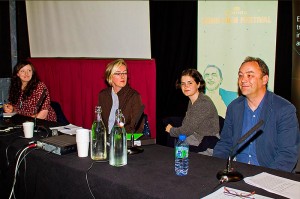
Commissioner and Expert Panel at Cork Film Fest Industry Seminar
Yes, very much! We need to create the basis of a proper industry here across the Screen Industries, and I am convinced that if we can reach a critical level it will be catalytic; spawning more production companies and freelance work, plus raising awareness of Cork as a serious player & therefore attracting more people in, and so it goes! It’s a bit ‘Chicken & Egg’ of course, which is a problem, but what I’m trying to do, or at least start, is in getting people with complimentary skills together, e.g. Writer, Producer, Director, DoP, to form proper, professional teams and production companies. This is vital in order to go for proper funding and to start working professionally together. Companies need to start working on a slate of development & production ideas; demarcating the work and roles so that they’re focussed and share the load equally. I, in turn, am simultaneously trying to set up key infrastructural projects which these companies can use so that they can establish a rolling slate of projects that will keep them in work full time and grow their experience & profile. These are things like the Studio that I mentioned, plus getting a proper high-end Grading f acility together in Cork and also securing money and/or premises for Start-Up companies who can cross fertilize with each other in the same building.
I am currently working on all of these ideas, plus identifying key growth areas and skilled, Cork based professionals, in the areas of Animation, Finishing, high-end digital camera rental and On-Line Content. Things are growing here – we have proper Post Production Sound mixing here now, plus excellent lighting hire and four or five small production companies, but we need to develop more of these.
The biggest thing missing, in my opinion, is in production – we seriously lack experienced Producers and Production Managers to organize and drive projects from inception through to exhibition; to lead the team, deliver the product and, of course, chase the money! Without these key people things just don’t develop enough. We have one or two production people resident here who have the potential to be really good producers, but in that old ‘chicken & egg’ scenario again they are not getting the right experience on properly funded projects that will enable them to grow projects and companies here.
I am trying to resolve this by identifying key people here & putting them in touch with more established companies in Dublin & seeing if they can ‘shadow’ Producers & PM’s on shoots up there to get that vital experience. The events I ran at the Film Festival worked really well in bringing top industry professionals down here to see what’s happening and to meet the key teams & production people, so I have hopes for that in the long term. I’m also identifying experienced Producers around Ireland who either have some connection to Cork or who are willing to work with people here on ideas and am putting them together to see what comes of it.
What are the benefits film can bring to a county or indeed a country?
As a Regional Screen Commissioner I’m obviously focused on the County benefits rather than the National ones – that’s the job of the Film Board and RTE officially and they are designated as the national organizations to represent Ireland as a whole abroad. The local benefits I see are fundamentally to bring freelance work in to professionals based here, to create freelance & ultimately full time employment in highly skilled, ‘clean’ creative areas, and the subsequent economic spin-off directly to the local economy via location fees, production spend and Tourism on the back end.
Creatively, the Screen Industries offer a way for us to communicate our ideas, messages and creativity to a worldwide audience from our unique perspective, and that is important for any Region in the World. The set of social, economic and cultural values that we have here in Cork allows us to comment and add to the international discourse in an increasingly connected and converging World where we share common issues and concerns about the future and the way we see ‘society’ going for better or worse. Cork has as valid an input into this as any other place in my opinion, including the big cities of the World, and with the New Technologies we can overcome the geographical obstacles that have kept us on the perimeter of this discussion in the past.
What are the unique things Cork city and county can offer film and TV producers?
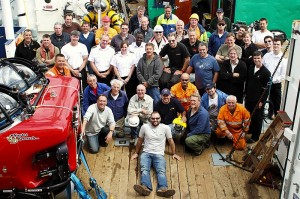
Niall with Dark Secrets of the Lusitania Doc crew
OK – here comes ‘The Sell’!! As the largest County in Ireland, Cork is unique in the range of photogenic, underused location in the Country; comprising 4 distinct geographical areas plus the second biggest City, which has it’s own wealth of preserved period as well as modern architectural features. Add to this newly improved motorway links to Dublin and a brand new International airport that can get you to & from central London in less than an hour & you have a very attractive destination! And there’s more….. Cork is blessed with a range of Towns, all within easy reach of the City, that are both beautiful and big enough to support a full sized crew, with enough beds, restaurants & support services nearby to make filming cost effective. They also possess a range of great natural & historical/architectural locations within a very small radius, meaning you don’t waste time & money moving the crew around. You always have the infrastructural back-up of the City behind you as well, so you can get most anything you need. Finally, having a dedicated Screen Commission in place to help with official permissions, location recces and sourcing all manner of facilities & production support locally makes life a lot easier and cheaper for Producers. A Producer can access these remotely via the portal website and then speak directly to an experienced production person (me!) anytime, which is really important in this fast-moving industry.
In fairness, thanks to the stated aims of both Councils, we can honestly say that we are a film friendly Region, and having that official goodwill on our side is invaluable, as all good Producers know how difficult & expensive it can be to film in a place where they are either not very welcome or people are fed up with film crews!
I could go on, but you get the idea!
What is your impression of the film industry in munster, and in particular in cork at present?
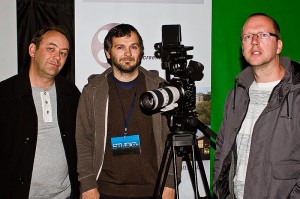
Niall with Paddy O’Shea & Declan Recks, Director at Studio 5108 Canon Masterclass
I think the industry is still very fragmented across Munster, and in many ways embryonic, but things are improving slowly. I honestly feel that Cork is taking the lead, however, and the evidence for that can be seen in both the amount & quality of work being produced here last year and this year, and the reaction of Industry leaders from Dublin who came down to the Film Festival and expressed their interest and surprise at how much was going on! The word is coming back that people are starting to talk about what’s going on in Cork on sets around Dublin, and that’s got to be a good thing!
I noticed a definite and immediate upturn in confidence and determination in the indigenous industry after the Film Festival and in the New Year – the phone started ringing on the 2nd January with people looking for meetings re developing projects and Dublin-based Location managers wanting to come down on recces. I’ve put a lot of work into the latter, and am glad to see that it’s starting to pay dividends. Creating an whole industry is always going to be a ‘slow burn’ as you build trust, awareness and confidence, and the last year’s work was all about doing just that to get to this point. Some people expect immediate, tangible results, but I’m afraid our industry is just not like that!
I have a real confidence that we are on the road to creating a viable industry here – what we need now is to create some proper Production Companies and get Producers on board to secure decent funding for productions. Once that happens, they can develop their slate of productions, raising their skill level, experience and reputation to get further work & expand the industry here.
Strangely, I think we’re fortunate in a way here, as opposed to traditional production centers like Dublin. The industry is changing massively, and budgets/advertising and production revenue is plummeting. That’s bad news for the big players and established companies, who have the weight of expensive Rents, rates, employees and ways of working which are becoming just too expensive in the face of fierce international competition.
As we don’t have all that, we are free to grasp the opportunities that the New Technologies and platforms offer us and can start producing material that is both creative, cost-effective and audience-centred, which is what the market wants these days. If I could say one thing to the industry here it would be ‘Go out & do it – you have nothing to lose!’
For further information or advice you can contact Niall at: info@corkscreencommission.com
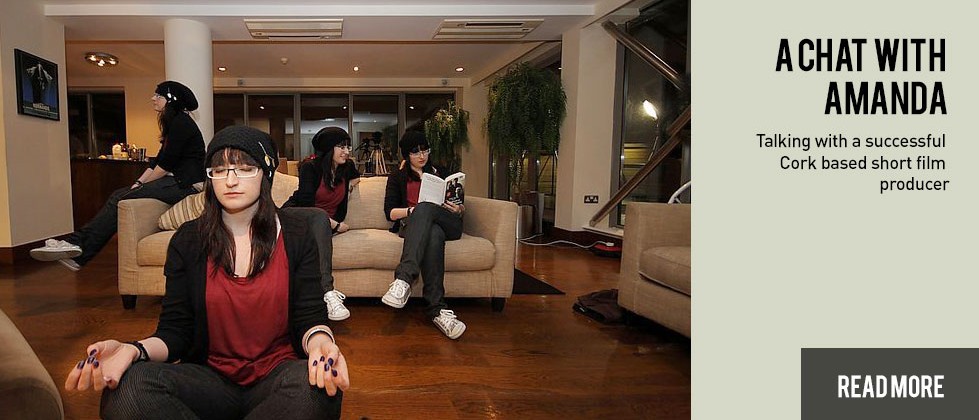
by SeanBreathnach | Nov 23, 2012 | Education, Producing
[image_frame style=”framed_shadow” align=”left”]http://egomotion.net/wp-content/uploads/2012/10/amanda1-179×300.jpg[/image_frame]
A Chat With A Cork Based Movie Producer
Amanda Ferriter began working in Theatre Production in 2004. She has worked as a Production/ Stage Manager with various companies including Cork Opera House), Guiness Jazz Festival, St Patricks Festival, Opera 2005, Yew Tree Theatre and Cork Midsummer Festival. In 2005, she working with the Scottish production company GridIron in the Edinburgh Fringe Festival. She recently stage managed a national tour of Verdant Productions ‘Guerilla Days in Ireland’. Amanda has also produced the award winning short films ‘Heart’ and ‘Partly Cloudy’ by Mark Cogan, ‘Gemma?’ by Kevin O Neill, ‘Mutt’ by Shaun O Connor. She was also co-producer of Liam Delahunty’s ‘Tom’s Sceadu’. Her current project is ‘The Nymph’ by Damian Byrne.
What is the best part of the job?
I honestly can’t pick one part of the job that I prefer over another! I love being on set and seeing what is on the page come to life, from the very first take to wrap its great watching the story unfold in front of you. Being the producer, most of your prep work is done so you have time to be on set and soak up the atmosphere! Another part I love is having the first public screening. Sure its nerve-racking not knowing how it will be received but ultimately people getting to see the short is one of the reasons why we make them. There’s no point in working hard for a project to sit on your computer for no one to see.
What is the worst part of the job?
The worst part for me is asking people to either work for free or at a reduced rate. There are so many talented people in the film industry in Cork but unfortunately there are not enough funding resources for everyone or for the amount of work being produced. Yes there are things like Fundit and kickstarter but it seems to me that the majority of projects are self-funded. I’d love to be able to pay everyone what they deserve, sometimes that’s just not possible. You do the best you can with your budget, but there can be times where you have to postpone the project and wait until you raise a bit more funding or you can scrap it… That’s never an option!
Leading up to a shoot – how much preparation do you do?
I would do a lot of the preparation leading up to a shoot, from finding locations, crew and sometimes cast (usually directors have some actors attached already or have people in mind for the roles) to organizing the schedules, logistics, catering, dealing with budgets, hiring equipment and arranging insurance. I’d liaise with each HOD to ensure that they have everything they need before getting to set. A lot of people say I’m crazy for liking the production side of the shoot but there’s a huge sense of satisfaction when you can make something come together.
[image_frame style=”framed_shadow” align=”left”]http://egomotion.net/wp-content/uploads/2012/11/IMG_7399-300×200.jpg[/image_frame]
What do you want from a Director? What is the ideal relationship?
Mutual trust and understanding. It’s so important to have that in the director/producer relationship. For a director, you are trusting someone to bring all the elements together. As a producer, you want to do the best you can so that what ends up on screen is what the director envisioned. Yeah there are times where you have disagreements where one person doesn’t want to budge on something, whether its a creative or budgetary issue, so you look at the bigger picture, find a compromise and do what’s best for the project. The Director and Producer want to create something that people will enjoy and they have to be on the same page for that to happen. They spend a lot of time together and talk numerous times a day in the lead up to a production so you have to get along on a friendship level too. I’ve worked with some really great Directors and I’m glad to call them my friends.
What was the biggest challenge regarding your most recent film?
The short film I’m currently producing (The Nymph by Damian Byrne) is proving to be the most challenging! It’s a night shoot with a few effects so making sure every detail is thought through carefully and planned properly is essential. We have an extremely small budget but its such a great story that it needs to be put on screen. We’re filming over 2 nights in an amazing location but if it rains, we’ve no choice but to postpone until early 2013. My main challenge on this however is having a tiny budget so we have to beg, borrow and steal in order to get it done. There are some amazingly talented people attached to it so as long as the rain holds off and I can put everything in place, I know something great is going to be created, despite the lack of a big budget!
[image_frame style=”framed_shadow” align=”right”]http://egomotion.net/wp-content/uploads/2012/10/amanda21.jpg[/image_frame]
At what point does the producer divorce themselves from a project?
For me, I’d take a step back once a project has been screened in a few festivals. After a film has been completed, I’d discuss with the Director what festivals to submit to. We’d work towards getting it screened in as many as possible, that can take longer than a year but once we feel that its had enough screenings, I think its time to put it up online for a wider audience to view it. With ‘Heart’, I wouldn’t let Mark put it online for at least a year and it was quite successful on the festival market but the online views have so far exceeded over 80,000, its far more than we could of hoped for and we are delighted with. You can stop working on a project but you never really divorce yourself fully as there’s always a sense of pride in something you’ve worked so hard on.
Who would you say your biggest inspirations are in the film world?
What inspired me to get into film was (and people may laugh at this reply but..) Lord of The Rings. I was in New Zealand in 2009 and went on a daylong tour of the filming locations around Wellington. It was really fascinating to see how they took a patch of green by a housing estate and turned it into the gardens of Isengard! I’ve always been a huge LODR fan ever since the movies came out and I used to watch the ‘making of’ more than the films themselves. When I got back to Cork, I started looking at my options and as film had always interested me, I decided to enrol in the St John’s film course. As for any favourite Producers or Directors, I don’t have any, as there are so many that I like. I don’t have a favourite genre either but I am fan of sci-fi and fantasy books and films and would love one day to be able to produce or be involved in making that genre of film here in the south of Ireland. Its great to have favourites but I like to be open to all films and genres.
What is your impression of the film industry in munster, and in particular in cork at present?
[image_frame style=”framed_shadow” align=”left”]http://egomotion.net/wp-content/uploads/2012/11/LIT_film_fest012.jpg[/image_frame]
The film industry in Cork is great at the moment! There are so many talented cast and crew producing amazing things. For a county that doesn’t have much funding available to us, the output of good quality work is incredible. I could list people but I’d be here for ages! There’s a great ‘can do’ attitude among everyone at the moment and a lovely camaraderie with people willing to help each other out too. I think its going to take another few years before we see big budget films frequenting the city and county but I hope it will get there eventually. The ‘important’ people are beginning to take notice of the talent and facilities available here and as long as we keep going as we’re going, its for our and future film makers benefit.
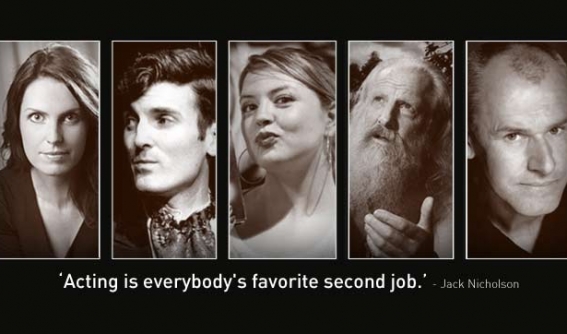
by SeanBreathnach | Aug 1, 2012 | Acting, Education, featured
A Conversation With Cork Based Actors
This week we interviewed some local actors to get their take on the short film scene, and to find out what makes them tick.
The actors we interviewed are:
[image_frame style=”framed_shadow” align=”left” height=”160″ width=”200″]http://egomotion.net/wp-content/uploads/2012/07/ruth-hayes-headshot-bw-medium-199×300.jpg[/image_frame]RUTH HAYES:
Ruth studied drama with LAMDA, here in Cork. She went on to study screen acting in both Cork and Dublin with the Irish Film Academy and with award winning writer and director Terry Mc Mahon. She has appeared in numerous performances on the Cork stage over the years, including Dancing at Lughnasa, The Country, A Serving of Pinter, Playboy of the Western World and Tons of Money. Her musical theatre credits include the lead characters in Guys and Dolls and My Fair Lady. On Screen, Ruth has featured in several short films including, Partly Cloudy, Th3 Room, Searching for Ten, Grief and Dying Wish. Ruth also played the lead character in the independent feature film The Far Road. http://osullivantheactorsagent.com/?p=396
[image_frame style=”framed_shadow” align=”right” height=”160″ width=”200″]http://egomotion.net/wp-content/uploads/2012/07/jrh.jpg[/image_frame]
JOHN RYAN HOWARD:
John graduated from Kinsale College and has also trained under Hollywood’s top Acting coach Margie Haber of Margie Haber Studios, Los Angeles. He has performed leading roles in over 50 Short Horror & Comedy films.
John’s work on stage has ranged from Irish classics such as Brian Friel’s ‘Translations’ whereby he played the leading role of ‘Owen’ to farce comedy’s such as ‘A Flea In Her Ear’ whereby he played the role of ‘Etienne'(a role made famous by Sir Anthony Hopkins).
John’s latest performance as ‘Lord Henry Wotton’ in a stage adaptation of Oscar Wilde’s ‘The Picture of Dorian Gray’ (July 2012) earned him critical acclaim.
http://www.imdb.com/name/nm3319585/
[image_frame style=”framed_shadow” align=”left” height=”160″ width=”200″]http://egomotion.net/wp-content/uploads/2012/07/CC-247×300.jpg[/image_frame]
CATHERINE CROWLEY:
When Catherine was growing up she wanted to be either an actress or a nun! Thus far the acting is winning that rivalry. If there is any aspect film-making, be it performing, sourcing props, clapper board, or even making the tea, there is nowhere she’d rather be. This is her passion.
Catherine studied acting in the School of Music and the Actors Space in Vic, Spain. She has been involved in several productions including ‘Baby Boots’ [dir. Dan O Connell], ‘Flipping Channels’ [dir. Fiona Riodan] and most recently ‘Partly Cloudy’ [dir.. Mark Cogan]
http://catherinecrowley.webs.com/
[image_frame style=”framed_shadow” align=”right” height=”160″ width=”200″]http://egomotion.net/wp-content/uploads/2012/08/534181_10150910420164219_1680869318_n.jpg[/image_frame]
FRANK HURLEY:
Frank Hurley starred in the lead role in the recent award winning short film “A Selfless Act”. Prior to this he has acted in several short films which have been screened in film festivals at home and abroad. Frank hHas also turned his hand to producing and has produced his last three films, ‘Baby Boots’ Twinkle Toes’ and ‘A Selfless Act’.
http://www.imdb.com/name/nm3810877/
[image_frame style=”framed_shadow” height=”160″ width=”200″]http://egomotion.net/wp-content/uploads/2012/07/SOC.jpg[/image_frame]STEPHEN O’CONNOR:
Stephen studied acting in The Gaiety School Of Acting and St John’s College, Cork after which he went on to act in over a dozen short films including The Lump (RTE / Ed Godsell) and The Legend Of Jonny King (Stormlight Productions). He has starred in Fair City and other RTE productions.
http://www.imdb.com/name/nm3734338/resume
The Interview:
1. What is the best part of the job?
Catherine: The best part to the job is meeting and working with people brimming with enthusiasm and talent. Being part of a friendly and passionate group also makes it not seem like work at all.
Ruth: I love getting to be someone else! I enjoy reading a script and discovering who the character is. Working out what makes them tick and how they respond to certain situations. Really getting under their skin. I’m obsessed with human behaviour, so the opportunity to play different characters in a disparity of situations is what I love most.
Stephen: Going home at the end of the day knowing that you did the best you could.
John: Personally, when you find a role that suits you perfectly where you have the opportunity of using your own unique qualities that colour a character uniquely. Particularly on stage where you have the opportunity of being in character for a long period in front of an audience playing a lead role where you really grow into a role organically. And not to mention the fantastic craic you have during a run of a show, mostly with an ensemble cast. Due to the long period of time you spend with a cast and crew on a show, everybody becomes very attached to each other in a good way.
Frank: I suppose I’ve lived in a fantasy land all my life, I think its fair to say I’m not in touch with reality at all, at all, and acting allows me to live out some of those fantasies briefly.
2. What is the worst part of the job?
John: The ruthless business side of acting. How hard it is to get seen whether it be on stage or screen, just to get Casting directors to watch any of your material or to come to a live performance. Most jobs in Cork or indeed Ireland are unpaid acting jobs so it makes it very hard to support yourself when you are committed full-time. Auditions also tend to be a horrible experience for most actors, particularly when you don’t get a fair opportunity to show your potential for the given audition due to a lack of understanding about acting or actors.
Catherine: I suppose the instability of the business. It’s always tough when your not sure when the next job is coming.
Stephen: Going home at the end of the day knowing that you didn’t do the best you could.
Frank: Getting nowhere fast!
Ruth: The uncertainty, for sure. It’s not the kind of job where you train and hone your craft and then opportunities will follow suit. You’re not afforded the luxury of that kind of career trajectory. You can have times when you’re constantly working, then times when you hit a dry spell. It really can be a feast or a famine. You need a lot of determination to stick at it in those quieter times.
3. What advice would you have for anyone who wants to get into acting for screen?
Catherine: Less is more. The camera picks up everything, it is totally different to acting on stage. The camera captures thoughts so the smallest glance will mean a lot. Keep going to acting classes/courses as you can always learn more. The day you stop learning is the day you die.
Frank: Don’t try doing it off the cuff like I am, go to drama school and do it the professional way.
Stephen: Take a screen acting course and act in as many student films as you can. Student films are a great way to gain experience.
Ruth: Firstly, I would advise on doing a course in screen acting. There are so many great courses and workshops in acting for camera. It’s a completely different discipline to theatre acting. Yes you’re still doing your scene breakdown and character study but the delivery is very different. A lot of these courses will show you how to deal with life on set etc. Many of them will record you acting on camera. Even though it can be a cringe worthy experience, it’s invaluable for highlighting little habits that you may have that you need to kick when acting for screen. Once you have that done, then go and get the experience. Send your CV into St. John’s central college here in Cork and put yourself forward for as many short films as you can. Keep an eye out online for opportunities also. Of course Egomotion is a great place to get to know people and find out what’s happening. Fellow actor Marcus Bale also runs the Irish bulletin for actors and actresses, on facebook, so make sure you join that too!
John: Get as good a showreel as you can get, ideally by finding duologues where you can be seen to be clearly working off another actor, actively listening, clearly in the moment with a substantial amount of reaction shots of you. As the saying goes acting is re-acting. And to have as good a contrast as you can both drama and comedy to show as much of a range as you can manage.
4. What was the biggest challenge you faced in your most recent film?
Stephen: Trying to remember that “LESS IS MORE”!
Catherine: Honestly, Heels. It can be hard working in costume for the whole day on set. Particularly if you haven’t broken them in beforehand!
Ruth: Falling forward on cue and making it look natural!!
Frank: The last film i did I played the part of a down and out. A real life homeless person approached me as if I was living rough and tried to give me some advice, I found it very hard to admit to this person I was only acting a scene so I stayed in character rather than embarrass him. There were also lots of times when people would throw me some money and it was also difficult to stay in character on those occasions so as I wouldn’t embarrass myself.
5. What advice would you have for movie directors when directing actors?
Ruth: I love to have an open dialogue with a director. I have always seen movie making as a collaborative process so I guess I’d advise a director to be open to suggestions by an actor and allow them the freedom to make choices in a scene. This is all within reason though and it’s important that the actor doesn’t go off on a tangent and veer from the essence of the character and the script. Good communication skills are vital here.
Frank: Give the actor direction! A lot of directors would leave it to your own interpretation, I personally think it would be easier for me if the director explained to the actor the story that was being played in his head but then, if I knew what to tell a director to do, then I’d be a director myself.
John: Be clear on what you want from the actor but trust the actor enough to do his/her job. Great directors, I think, give just enough guidance for you to fufill the requirements of a role without dictating the performance or restricting the actors’ own creative process.
Stephen: Listen to your actors before you shout “Action”.
Catherine: Everyone is different so it’s hard to say one thing that will work for everyone.
‘Communication is key’ – I know its a totally over used phrase but it is also very true. Be clear with how you want a scene to be, but be open and receptive to how the actor interpreted the script. This is why I personally think having rehearsals before going to set is a massive advantage. Also using storyboards in preproduction is quite helpful as you see what the director has envisaged and discuss it with them.
6. Who would you say are your biggest inspirations in the film world?
Frank: I’ve always admired the acting of Mel Gibson and Tom Hanks.
John: Al Pacino, Anthony Hopkins, Kevin Bacon, Colin Farrell, Gabriel Byrne.
Stephen: Gabriel Byrne and the late Donal McCann.
Catherine: Hard question as there are so many…
Males: Robert Di Nero, Al Pacino, Peter Ustinov, Dustin Hoffman.
Females: Maggie Smith, Meryl Streep, Michelle Pfeiffer, Sally Field.
Ruth: It’s really difficult to single anyone out. The people that inspire me are those who are not afraid to take risks, be it an actor, director or writer. Those who make the brave choices and see the job through. It’s tough to get projects made at times, so I have great admiration for those who have the vision and chutzpa to see a production come to fruition. Because we are such a small country, I always feel inspired and have a sense of pride when I see ‘our own’ doing well.
7. Are there any particular roles that you relish, or that you would love to get your teeth into?
Stephen: Dracula.
Frank: I’ve always fancied the idea of being a renegade soldier in a war movie but I’d also love to get into more comedic roles, so if there are any good directors out there with comedy war movies give me a shout.
Ruth: I’m delighted to say that I’ve played a good cross section of characters over the years. I’ve gone from drama to comedy to horror! However I’d love to get my teeth into a great action role. I’ve played the victim a lot so the chance to play a strong woman who can kick butt sounds like fun!
John: Well recently having played ‘Lord Henry’ in Oscar Wilde’s ‘The Picture of Dorian Gray’ directed by Cal Duggan for Kinsale Arts Week, I found it to be the role of a lifetime that suited my own unique quality of humour and found a substantial amount of personal parallels with the character that gave me a very specific avenue into the role and gave it 3 dimensions for me as a result. It was the best acting I’ve ever done as a result and those familiar with my work concurred. It just goes to show when you get THAT role that’s made for you.
Catherine: I want to do it all!! I never want to be typecast. However in saying that, villains appeal to me. When I was small I was always more fascinated with Maleficent and Ursula the Sea Witch than I was with Sleeping Beauty or Ariel. I love evil characters who are more fleshed out, relate able and fun.
8. What is your impression of the film industry in munster, and in particular in cork at present?
Catherine: I know it’s been said before in the other interviews on Egomotion but we can all feel a change at the moment. The Cork film scene is buzzing, gaining momentum and popularity. Our hope is that soon Cork will be one of the top spots for film companies to come and work in. We have hard working, talented people in Cork. We just need the funding so these people don’t have to move elsewhere to get steady work in our industry.
John: I think there is an incredible wealth of talent that has to break through at some stage, but something needs to happen for that to occur and I’m not so sure what that is yet.
Frank: Non existent.
Stephen: A sleeping Giant that is about to awake.
Ruth: Well there certainly is a buzz around Cork film making at the moment. It’s about time too. As part of this job I have to travel up to Dublin a lot. It’s nice to know that things are beginning to happen down here. There’s such a wealth of talent and experience amongst the film community here in Munster. What I love most about the community down here, is that people are extremely supportive of each other. There’s a sense of comradery and good will. We’ve all helped each other out in different projects over the years. Long may it continue to flourish.
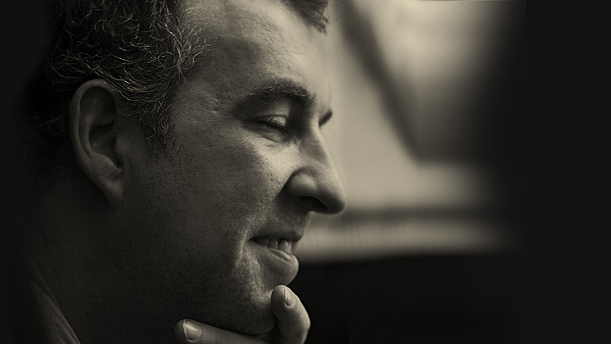
by SeanBreathnach | Jul 5, 2012 | Cinematography, Education, featured, Short film
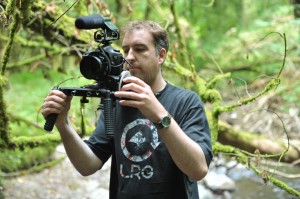
This week we interviewed one of the hardest working camera operator’s and D.O.P.’s in Cork, Paraic English.
Páraic has worked as DOP on dozens of films, including ‘Hungry Hickory’ (Short Film, Dir. Damien McCarthy) and ‘Penny’ (Short Film, Dir. Patrick O’Shea). He has shot and edited short films, documentaries, adverts, stock and catalogue Shoots in Ireland and abroad. A comprehensive list of credits can be seen on his IMDB page: http://www.imdb.com/name/nm3279826/
Every time I attend a film festival in Munster I see your name on films. Have you worked with everyone in Cork at this stage?
Nope. Cork is so small, crews and cast often overlap over different projects. It’s good for continuity and building working relationships but at the same time I’m always happy to hear new ideas from ‘strangers’ or strange ideas from ‘newbies’.
Are you shooting something at the moment? Can you tell us a little about it?
Ya always working away on something thankfully, it’s wedding season! I enjoy doing short promos, most recently one for an Opera Production, part of the Midsummer Festival. We have some scenes left to shoot for Kevin O’Neill’s upcoming short film too and a trip to the west of Ireland is in the offing soon too to shoot the CFC/RTE Short Script Award Film ‘Leanbh’. Other than that I’m kept busy freelancing for production companies grabbing B-Roll, talking heads and sunshine shots for corporate and event films. Trying to get my head around motion-controlled timelapse for a wee trip in August too. It’s complicated and I don’t have a head for figures.
How important is the script to you?
It’s the blueprint for months of planning and effort as far as production crew are concerned. However, there’s so much room between the words for actor performance, score, camera and pacing that I’m often thankful I’m only a techie. I rarely read it more than twice.
What is your favourite part of the job?
Apart from the early starts and late finishes? Eh, editing. That’s where it all comes together. You do get to see some cool stuff now and again. Film is something that can bring people together so that’s nice to be a part of.
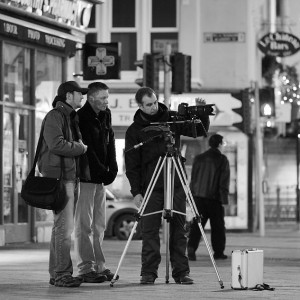
What is the worst part of the job?
Multi-tasking. Keeping an eye on light continuity, eyelines, shooting for the edit, boom in shot, makeup, shadows, composition, moving the camera, the other cameras, unravelling the slate notes. You get the idea. You’d be knackered after it.
Who would you say your biggest inspirations are in film?
Werner Herzog, Roy Andersson, Robert Altman, Hitchcock, Fellini (for the madness and the moving camera), Scorsese, Orson Welles for Lady From Shanghai alone, I’m partial to a bit of Terence Malick too. Anything Jack Cardiff shot. I like the stylistic touches of Jean Pierre Jeunet & De Palma too sometimes. Roger Deakins is a great storyteller and shares lots of his techniques online too which is great for anyone with an interest. Laurel & Hardy films are always a winner.
What was the biggest challenge on your most recent film? Do you find the same challenges coming up again and again?
Ya always the same challenges. Smaller budgets mean short shoots in locations that often can’t be modified or adequately lit and sadly the lack of technical prep time can have consequences. Compared to the challenges of the production team they pale – everyone does the best they can with what they got. I have lots of admiration for anyone who actually makes a film, it takes a lot of guts.
How much have things changed in your line of work in the last ten years?
Very little. It’s more affordable in some ways to get a good image onscreen but a good story well told will never change. The internet is probably the greatest change. New market and a whole new set of imponderables.
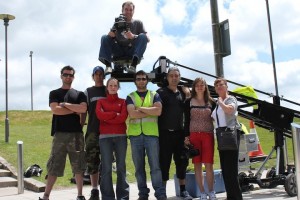
Have you particular advice to give amateur film makers regarding camera work and lighting in their movies?
Fix it in post.
What do you think of the condition of filmmaking in Cork at the current time?
I’m optimistic. In the past, scripts may have fallen by the wayside but there now seems to be an appetite and personnel to see through projects to a high standard. Lots of distinctive original voices coming through. Ireland is a cinema-loving and cinema-literate nation. My wish would be that this would continue so we can make our mistakes now and if funding materialises in the future we’ll be in a better position to deliver something we can be proud of.
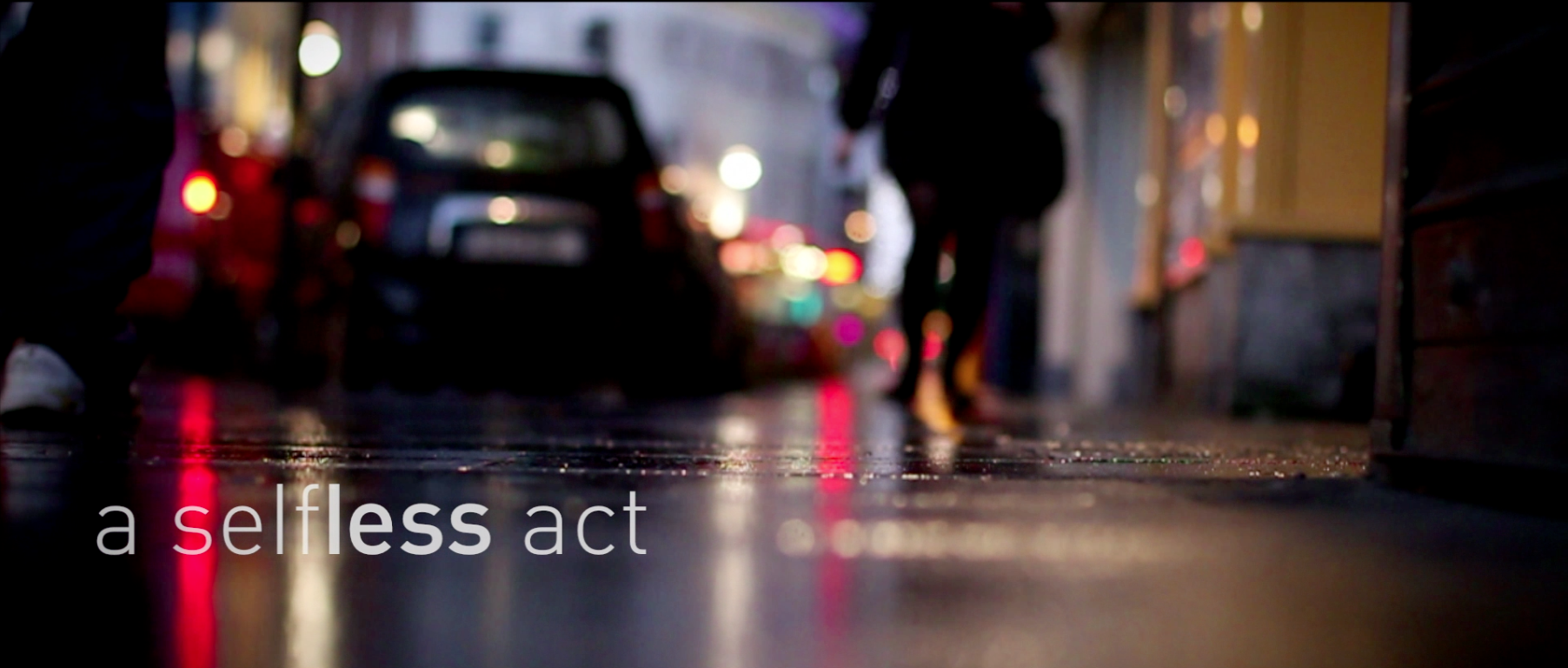
by Dan | Jun 11, 2012 | Short film
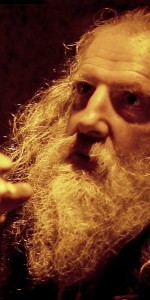
Winner of the Ford 8minutes Short Film Competition.
Written by: Dan O’Connell & Frank Hurley
Directed by: Dan O’Connell
Starring: Frank Hurley & John Ryan Howard
Director of Photography: Jason Keane
Available to watch online now on the irish film boards website
‘A Selfless Act’ was made especially for the Ford 8minutes Competition and addresses the themes of hope, selflessness and the division of classes from the Titanic 100 Celebrations. The film features an old homeless man (played by Frank Hurley) who has a brief encounter with a wealthy young business man (played by John Ryan Howard).
Set in Cork City on a wet and dreary night and shot entirely on location by Director of photography, Jason Keane, the film uses 100% natural lighting and features an amazing soundtrack performed by Odi, entitled ” One in a Million” which can be purchased online http://www.odimusic.co.uk, http://www.itunes.com/odi
We had a great time making this film, which was all shot in one night and the edit was finalised only 3 days later, we had great help and support making it from some really great people, including the fantastic Staff and Management of Londis on Bridge Street, they even gave us free Coffee!! Catherine Crowley who ran around ragged trying to piece together the costumes and props, Valerie Hely who helped us get the awesome ‘Odi’ soundtrack, Desiree Murphy for feeding us all as we ran around like blue arse flies.















